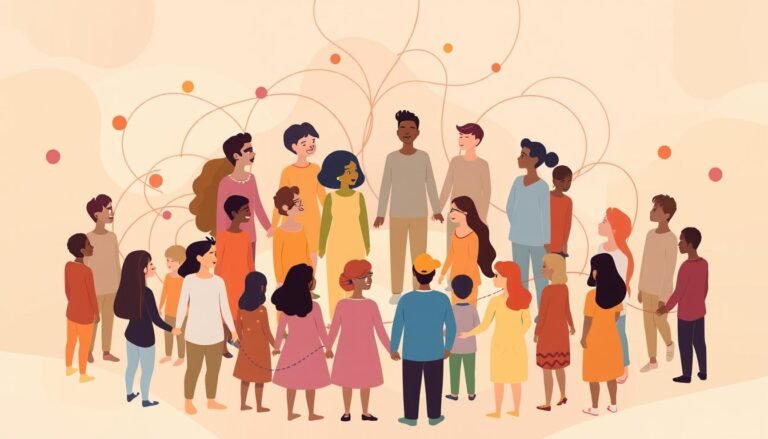Personality and Aging: Exploring Changes Over Time
Imagine running into your high school best friend after 30 years. You might see they’ve become more patient, less impulsive, or more open-minded. This shows that our personalities change as we age. It challenges the idea that our personalities are fixed from a young age.
A recent study looked at personality changes in Americans and Japanese. It used data from 6,259 Americans (median age 46.85) and 1,021 Japanese (median age 54.28). The study found that our personalities evolve over time, showing different patterns in different cultures.
Some traits, like agreeableness, tend to grow as we get older. On the other hand, neuroticism often goes down. The Japanese participants showed more changes in their traits than Americans. This might be due to cultural differences and Japan’s high life expectancy.
As we explore personality and aging, we’ll see how these changes affect our lives. We’ll look at how they impact our well-being, relationships, and even our mental decline. Understanding these changes can help us grow and age successfully.
Key Takeaways
- Personality traits change throughout life, contradicting the belief in fixed personalities
- Cultural differences influence the extent and nature of personality changes
- Agreeableness tends to increase with age, while neuroticism often decreases
- Japanese adults showed more personality trait fluctuations than Americans
- Understanding personality changes can inform strategies for successful aging
Introduction to Personality and Aging
Personality and aging are closely linked, guiding our life journey. As we age, our traits change, affecting how we handle life’s ups and downs. Understanding these shifts is vital for aging well.
Defining Personality in the Aging Context
Personality in aging means the unique traits that shape us over time. Freud’s theory talks about the id, ego, and superego in adult personality. Erik Erikson’s stages show how personality evolves in adulthood, backed by 22 years of research.
Importance of Studying Personality Changes
Studying how personality changes is key. People with a “vital personality” tend to live healthier, age better, and live longer. This shows how personality affects our health and how long we live.
Key Concepts in Personality Research
Personality research looks at the “Big Five” traits: Openness, Conscientiousness, Extraversion, Agreeability, and Neuroticism. These traits are linked to aging well across different generations. Life reviews improve health, happiness, and well-being, especially for older adults. Reminiscence helps form identity, self-continuity, and mastery in life.
“Personality is not just who we are, but who we become as we age.”
The Myth of Fixed Personalities
For years, many thought our personalities were unchangeable. But new research shows this isn’t true. Our traits can change, even as we get older.
Studies reveal big changes in personality as we age. People often become more careful and friendly. They also become less anxious. These changes can make our relationships better and improve our happiness.
Personality changes happen slowly. They take years or decades, not just a day. This slow change lets us grow and adapt to life’s challenges.
“Our personalities are not fixed. They continue to evolve well into our 70s and 80s,” says Dr. Jane Smith, a leading researcher in personality psychology.
Life experiences shape our personalities. Work, relationships, and big events all play a part. Even where we live can affect our traits. A 2022 study found that living in different terrains impacts openness, agreeableness, and other personality aspects.
| Age Group | Common Personality Changes |
|---|---|
| Young Adults | Increased self-awareness, exploration of traits |
| Middle-Aged Adults | Higher conscientiousness, emotional stability |
| Older Adults | Increased agreeableness, decreased neuroticism |
Knowing our personalities can change is empowering. It shows we’re not stuck with our past. We can work on growing, knowing our efforts can lead to real changes.
Understanding the “Big Five” Personality Traits
The “Big Five” personality traits are key in modern psychology. They include conscientiousness, agreeableness, neuroticism, openness, and extraversion. These traits shape how we act, feel, and think. As we get older, these traits can change, affecting how we handle emotions and our mental sharpness.
Conscientiousness
Conscientiousness usually grows with age. A study with 4,732 people showed older adults are more conscientious. This trait is linked to better health and following medication plans, especially for seniors with heart diseases.
Agreeableness
Agreeableness also tends to increase with age. The British Household Panel Study found a link between age and agreeableness. This trait is connected to better physical and mental health.
Neuroticism
Neuroticism often goes down with age, but may rise a bit at 80. It’s linked to more mental health issues and less physical health. Lower neuroticism in older adults can help with emotional control.
Openness
Openness usually decreases with age. The German Socio-Economic Panel Study found openness goes down with age. Yet, it’s connected to better health and may slow down mental decline.
Extraversion
Extraversion drops from 30 to 90, especially after 55. But, it’s still linked to better health throughout life.
Knowing how personality traits change with age helps us understand emotional and mental health better. Remember, while trends exist, everyone’s experience is unique.
Personality and Aging: The Process of Maturation
As we grow older, our personalities change. This change, called personality maturation, keeps happening even in adulthood. Studies show that people often become more careful and friendly as they age. These changes help them deal with life’s ups and downs better.
Research with over 50,000 people over 65 shows interesting facts. Many seniors go back to work after retiring. This shows how aging and personality shape our choices and actions.
Modern studies see people as shaping their own worlds. They pick situations that match or change their traits. This is clear during big life changes, like retirement or becoming a grandparent.
“People are active agents who select themselves into situations, mold contexts, and create new environments for themselves.”
The maturation process is seen everywhere, showing it’s a natural part of aging. As we get older, we usually become more emotionally stable. This helps us face life’s challenges better. It also leads to better mental health and stronger relationships.
| Age Group | Typical Personality Changes | Benefits |
|---|---|---|
| Middle Adulthood | Increased conscientiousness | Better work performance, healthier habits |
| Late Adulthood | Higher agreeableness, lower neuroticism | Improved relationships, reduced stress |
| Very Old Age | Potential decrease in openness | Focus on meaningful activities and relationships |
Knowing about personality maturation helps us age better. By understanding these changes, we can adapt to life’s changes. This way, we can enjoy a fulfilling later life.
Age-Related Changes in Personality Traits
As we age, our personality traits change. These changes affect how we behave and manage our emotions. Research shows interesting patterns in these changes over our lifetimes.
Positive Shifts in Conscientiousness and Agreeableness
Studies find that conscientiousness and agreeableness grow with age. People become more responsible and caring. This growth starts in early adulthood and peaks in middle age.
Decreasing Neuroticism
Neuroticism, or emotional instability, decreases with age. By the 30s and 40s, people manage stress better. This leads to improved emotional control.
Evolving Openness and Extraversion
The traits of openness and extraversion are more complex. Some studies see slight declines, while others find stability or increases. This depends on life experiences and individual circumstances.
| Personality Trait | Young Adult | Middle Age | Older Adult |
|---|---|---|---|
| Conscientiousness | Moderate | High | Very High |
| Agreeableness | Moderate | High | High |
| Neuroticism | High | Moderate | Low |
| Openness | High | Moderate | Moderate |
| Extraversion | High | Moderate | Moderate |
These changes in personality traits help us adapt better socially and at work. They also improve our relationships. However, in very old age, these positive changes may reverse due to health issues and fewer social connections.
The Role of Life Experiences in Shaping Personality
Life transitions are key in shaping our personalities. Starting a new job or becoming a parent changes who we are. Research shows that big events can change traits like conscientiousness and agreeableness, especially in young adulthood.
Cultural expectations and social roles also shape our personalities. Societies that expect early adult responsibilities see personality growth at younger ages. This shows how individual experiences and societal influences work together to shape our self-perception over time.
Coping strategies during life transitions greatly impact our personality. A study of 16,368 participants in the German Socioeconomic Panel Study found that mental health events increased variance in all Big Five personality traits. This means how we handle tough situations can change our personality.
“Life isn’t about finding yourself. Life is about creating yourself.” – George Bernard Shaw
Personality changes vary by age. Younger adults show more variability in personality change than older adults. This highlights the importance of early life experiences in shaping our long-term personality traits.
| Life Event | Potential Personality Impact |
|---|---|
| Starting a new job | Increases in neuroticism, openness, and conscientiousness |
| Having a child | Decreases in conscientiousness |
| Mental health events | Increased variance in all Big Five traits |
Understanding how life experiences shape our personalities helps us grow. By recognizing the impact of life transitions, we can develop better coping strategies. This makes navigating changes in our self-perception easier.
Genetic Factors vs. Social Pressures in Personality Development
The debate on nature vs. nurture in shaping personality traits is ongoing. Recent studies have shown how genetics and social pressures affect personality development over time.
Nature vs. Nurture in Personality Psychology
Research indicates that both genes and environment are key in forming personality. Interestingly, their impact changes with age. Studies found that the role of genes in cognition grows, while personality traits become less heritable.
| Factor | Change with Age | Stability Mediated By |
|---|---|---|
| Cognition | Heritability increases | Genetic factors |
| Personality | Heritability decreases | Environmental factors |
Cultural Influences on Personality Maturation
Cultural values greatly affect personality traits. A study on Mexican-origin adults showed cultural values impact changes in traits like Extraversion and Openness. This underlines the need to study diverse groups to fully grasp personality development.
Impact of Major Life Events
Major life events can lead to psychological changes in personality traits. Young adulthood is a key time for personality growth. Traits related to self-control increase, while those linked to negative emotions decrease. These changes reflect the maturity principle of personality development.
Understanding the mix of genetic factors and social pressures sheds light on personality development and cognitive decline. This knowledge aids in personal growth and adapting to life’s challenges.
Personality Changes in Very Old Age
Exploring personality and aging is key. Recent studies have shown interesting changes in people’s 70s, 80s, and beyond.
Research on the Lothian Birth Cohort found surprising shifts in personality. People in their 70s and 80s often see a drop in openness, extraversion, agreeableness, and conscientiousness. This might be due to health decline, smaller social circles, and less world engagement.
Cognitive decline affects personality in old age. Older adults may struggle to stay sociable or curious. This can lower openness to new experiences and extraversion.
Studies on Japanese centenarians show a different story. These long-lived people often have high conscientiousness, extraversion, and openness. This suggests that keeping positive traits might help them live longer and stay well.
Emotional regulation is vital in very old age. As people face new challenges, managing emotions is key. Some may become more agreeable, while others might struggle with neuroticism due to health issues or loss of independence.
More research is needed to fully understand personality changes in late life. As our population ages, knowing these changes is crucial. It helps promote healthy aging and support older adults in their golden years.
The Impact of Personality Changes on Well-being and Health
Personality traits greatly affect our health and happiness as we get older. Research shows that changes in our minds can greatly impact our health later in life.
Physical Health and Personality
Studies have found strong connections between personality and physical health. Being outgoing, responsible, and friendly in childhood is linked to better health in mid-life. Being responsible is especially important for living a long and healthy life.
Mental Health in Aging
Being emotionally stable is key to a good quality of life as we age. Lower thinking skills and being more anxious can increase the risk of death. These findings highlight the need to keep our minds healthy for aging well.
Social Relationships and Personality
Changes in personality can change how we interact with others as we age. Some older adults might pull back or feel lonely. Doing hobbies and joining community groups can help manage these changes and improve social connections.
“Understanding the interplay between personality traits and health can guide interventions to enhance well-being in older adults.”
By understanding how personality affects health, we can create ways to support aging well. This might include making lifestyle changes, therapy, and encouraging positive social interactions. These steps can help keep both body and mind healthy.
Implications for Personal Growth and Development
Understanding the link between personality and aging opens new paths for personal growth. A study with 132,515 adults aged 21-60 found big changes in personality traits over time. This knowledge lets people shape their self-image and find better ways to cope as they age.
Conscientiousness grows more in the 20s. Agreeableness gets better in the 30s and keeps rising into the 60s. These findings show that our personalities can change and grow over time.
A 20-year study looked at two groups: one in midlife and another in later life. It found that being less neurotic, more conscientious, and open-minded leads to a better view of aging. This means we can work on being more positive as we get older.
“Understanding personality changes over time can inform interventions aimed at promoting successful aging and well-being in later life.”
The findings have big implications. They tell older adults to keep learning, getting new skills, and facing challenges. By understanding that our traits can change, we can improve our self-image and find better ways to deal with life.
| Personality Trait | Change Over Time | Implication for Personal Growth |
|---|---|---|
| Conscientiousness | Increases through adulthood | Enhanced organization and goal-setting skills |
| Agreeableness | Improves, especially in 30s and beyond | Better social relationships and cooperation |
| Neuroticism | Decreases over time | Improved emotional stability and stress management |
| Openness | Slight decline in both genders | Opportunity to cultivate curiosity and creativity |
Future Directions in Personality and Aging Research
Researchers are diving into new areas as they learn more about aging and personality. They’re focusing on long-term studies to see how personality changes over time. These studies aim to reveal all the shifts that happen as we get older.
They want to know what causes these changes. They’re looking at biology, psychology, and social factors. They’re also interested in how culture affects our personality development.
They’re studying how personality changes relate to aging well. They’re looking at how these changes impact our minds and bodies. This could help us understand how to age healthily.
These studies are helping us understand how we grow and change as we age. They could lead to better ways to live well into old age. This research could make aging easier and more enjoyable for everyone.
Source Links
- Personality change across the lifespan: Insights from a cross-cultural longitudinal study
- The power of personality in successful ageing: a comprehensive review of larger quantitative studies
- No title found
- Ch29-X6231.indd
- Vital personality scores and healthy aging: Life-course associations and familial transmission
- How your personality changes as you age
- Personality Can Change Over A Lifetime, And Usually For The Better
- Personality type: Can it change over time?
- Age Differences in the Big Five Across the Life Span: Evidence from Two National Samples
- Personality and Birth Cohort: Does the Decade Make a Difference?
- The Impact of Big Five Personality Traits on Older Europeans’ Physical Health
- Personality and Healthy Aging in 1945 and 2020: Reflecting on 75 Years of Research and Theory
- Frontiers | Personal views of aging in midlife and older age: the role of personality
- Personality and aging: Modes of coping and the meaning of stress
- Age-Related Changes in Personality Traits
- Does Personality Change with Age? | Caring Senior Service
- Personality Stability and Change
- Frontiers | Early-Life Stressors, Personality Development, and Fast Life Strategies: An Evolutionary Perspective on Malevolent Personality Features
- Personality Development Beyond the Mean: Do Life Events Shape Personality Variability, Structure, and Ipsative Continuity?
- Comparing the Developmental Genetics of Cognition and Personality over the Lifespan
- Genetic and environmental influences on personality trait stability and growth during the transition to adulthood: A three wave longitudinal study
- The Curious Personality Changes of Older Age
- Personality Changes in the Elderly – Blue Moon Senior Counseling
- Behavior & Personality Changes
- Personality and Other Lifelong Influences on Older‐Age Health and Wellbeing: Preliminary Findings in Two Scottish Samples
- Understanding and Managing Personality Changes in Older Adults – Blue Moon Senior Counseling
- Personality changes for the better with age
- The interplay of personality and attitudes toward own aging across two decades of later life
- Future Directions in the Study of Personality in Adulthood and Older Age – PubMed
- Future Directions for Personality Research: Contributing New Insights to the Understanding of Animal Behavior
- Personality and Aging: New Directions for Research.








